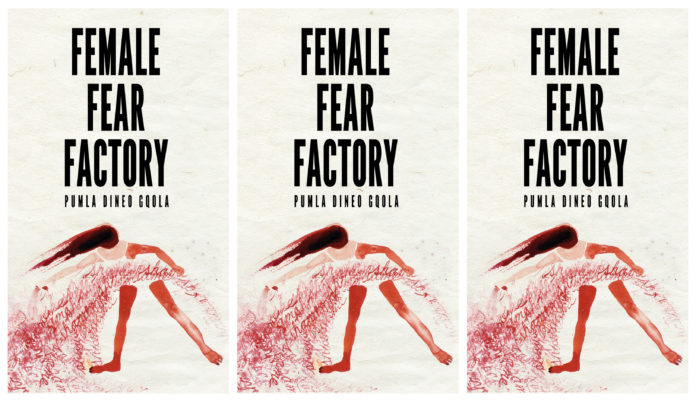Female Fear Factory is the much-anticipated follow up to the 2016 Sunday Times Alan Paton Award winner Rape: A South African Nightmare. Like the previous book on which it builds, Female Fear Factory fuses both razor sharp intellectual rigour and extensive research. Pumla Dineo Gqola, an icon of South African feminism, brilliantly traces the construction and machinations of the female fear factory by exposing its myths, lies and seductions.
An extract from the book has been republished below with permission from the publishers: Melinda Ferguson Books (an imprint of NB Publishers).
Script Four
Learn to fight so that you know both how to defend yourself effectively and how to inflict the most harm on a man’s body. This will keep you safe. It surprises and unnerves men when women know how to fight, especially when those women know how to fight well. Women also need to know how to use legal means to protect themselves. Report violence and get protection orders. Go to the police for help. Real violated women report.
For many women, and for one whose name is Leighandre ‘Baby Lee’ Jegels, this script about protecting yourself is particularly cruel. A black-belt karate champion for four uninterrupted years, she was a superior fighter. She was skilled, measured, composed. When this same woman became an undefeated boxing champion, not only was she obviously a star athlete, but she also entered a level of skillset rarely achieved. Add to this busy international athletic career a degree in Science Education from the University of Fort Hare, and it is clear just what a remarkable twenty-five-year-old she was.
But Baby Lee’s black belt and boxing gloves could not stop the three bullets fired at her from her ex-boyfriend’s gun, nor the one he reserved for her mother, Rita. The protection order against her police officer ex should have led to the confiscation of his gun. Baby Lee was a fighter who used her hands, her fists, her mind and the courts to fight. She could protect neither herself nor her mother the last Friday of August 2019. Patriarchal violence won against a woman previously undefeated.
RELATED: 5 Books To Read About Gender-Based Violence
It bears repeating: Baby Lee was an outstanding fighter and tactician. A violent police officer ex-boyfriend’s sense of entitlement to her life, his arrogance in believing that the laws he is sworn to enforce do not apply to him, the knowledge that he would physically lose against her saw her bleed out next to her car on the side of the freeway in the city in which I live. As a Tactical Task Team officer, Bulelani Manyakama knew how to plan the shooting and get away, as he was apprehended in a hired car over two hundred kilometres from the scene. He had been involved in a car accident, killing a further two people that day – a nurse and a librarian who were in the other car. He would die from injuries sustained in this accident a few days later.
Jesse Hess and Baby Lee were murdered on the same day, a week to the day after Uyinene Mrwetyana’s own murder. The two first-year university students were nineteen, while the star athlete graduate was twenty-five. They could have contributed so much to the world. All three cases, extensively covered in the media, were high profile. Because Uyinene had first made the news because she was missing, the news of the murders of these women hit the national headlines at the same time. It felt like there was a killing spree of women across the country.
This is because there is. There were many other cases of women targeted for violence in the news at the same time, and many more that did not make the news. If it felt like there was a war against women in South Africa that week, it is because there is.
Four scripts. Women raised in patriarchal societies know these well. We also know that there are more, and none of them keep us safe. Instead, they exhaust us and kill us. They require constant work and vigilance and they still do not work. In addition to the lie of ‘safety’ constantly dangled ahead of us, which we know is elusive, but which we are socialised to pursue, there is another sinister dimension. Knowing the magnitude and scale of what we are up against because it is paraded daily is not enough for patriarchal control. When women constantly modify their behaviour in pursuit of the unattainable safety, they take on the responsibility of what misogyny creates. Women are held responsible for their safety.
We have to refuse this burdensome responsibility and fight for a safe world for all of us. Walking wounded as many of us are, we are fighters. Patriarchy may terrorise and brutalise us, but we will not give up the fight. As we repeatedly take to the streets, defying the fear in spectacular and seemingly insignificant ways, we defend ourselves and speak in our own name.









